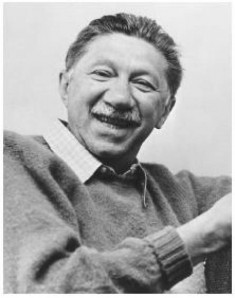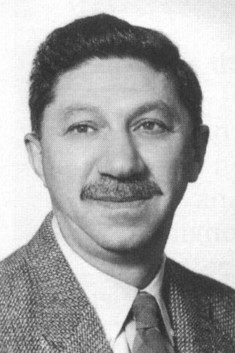| Abraham Maslow | |
|---|---|
 |
|
| Psychologist | |
| Born | April 1, 1908 Brooklyn, New York |
| Died | June 8, 1970 (at age 62) Menlo Park, California |
| Nationality | American |
Abraham Maslow emerged from obscurity to become one of the most important and influential psychologists of the 20th century. His development of the “Hierarchy of Needs” and contributions to humanistic psychology changed the way the field of psychology approached the study of human behavior and modeled the human mind.
Maslow’s Childhood Years
Abraham Maslow was the son of Jewish immigrants from Russia. His parents were barely educated and established a life on the lower rungs of the social-economic ladder of Brooklyn, New York.
Born in 1908, Maslow’s early life was miserable. As a Jew, he was frequently persecuted and bullied by local gangs in a racist environment. He was the first of seven children. He later developed a sense of “loathing” and even “hatred” for his own mother. He was also emotionally troubled. At one point he was classified as “mentally unstable” by a New York psychologist.
Educational Years
Although his parents were basically uneducated, they strongly believed that higher education was the key for their children to escape the ghetto and grind of life. Maslow enrolled in City College of New York where his parents urged him to study law, which Maslow hated.
In less than a year, he dropped out of law school and transferred to Cornell, but did not fare well there either. In the meantime, Maslow married his first cousin, Bertha Goodman, over the severe objections of his parents.
Maslow continued on, however, and returned to City College to earn his degree. He moved with his wife and first child to Wisconsin where he enrolled as a graduate student in psychology. He earned his master’s degree from the University of Wisconsin, finishing his thesis in 1931.
Early Contributions to Psychology
Maslow’s education was grounded in the mainstream theories of the day, which meant heavy doses of Freudian theory and the highly influential behaviorism ideals of B.F. Skinner.
But Maslow proved to be a thinker of extreme innovation. He proved to be a maverick in his field. He was a respected academic who was not afraid to challenge the basic assumptions held by the majority of the psychological community of the day.
For example, Maslow thought it wrong that Sigmund Freud had developed his theory of the human personality primarily through the study of the mentally ill or socially maladjusted people. Rather, Maslow reasoned that we should look to successful, happy, and well-adjusted people to formulate the basic theories of what makes people “normal.” Abraham Maslow is sometimes referred to as the “anti-Sigmund Freud.”
The Hierarchy of Needs
 Maslow was also suspicious of the lack of spiritual considerations in both Freud’s ideas and the ideas from Skinner’s school of behaviorism. Both Freud and Skinner were essentially atheists and modeled human behavior on the idea that human beings are more or less intelligent biological machines reacting and adapting to their environments.
Maslow was also suspicious of the lack of spiritual considerations in both Freud’s ideas and the ideas from Skinner’s school of behaviorism. Both Freud and Skinner were essentially atheists and modeled human behavior on the idea that human beings are more or less intelligent biological machines reacting and adapting to their environments.
Maslow, however, saw it differently. He felt there were higher aspects to the human psyche that could not be ignored. To this end, Maslow would eventually develop the model he has become most famous for — the pyramidal structure of his “hierarchy of needs.”
Maslow’s hierarchy of needs suggests that for humans to achieve a higher state of happiness, they must first have a lower order of needs satisfied. The process is illustrated in pyramid format. At the base of the pyramid are the most basic needs of survival: Oxygen, food, water, sex, sleep. Without those, Maslow said, the organism would die.
But once the lowest order needs are met, the human being can then move up to the next level, which are things like security of body, safety, good health, family, etc.
There are five levels to Maslow’s hierarchy of needs. At the peak was an idea that he called “self actualization.” This is the highest state of peace, happiness, love and intelligence that human beings can achieve after all of their lower level needs are taken care of.
Death and Legacy
Abraham Maslow died in 1970 at the age of 62 from a heart attack while jogging in Menlo Park, California.
Terms coined by Maslow, such as “peak experience” and “self actualization,” have become household words. The work of Maslow is seen by many as a ray of light that parted the dark path psychology had adopted in the works of Freud and Skinner.